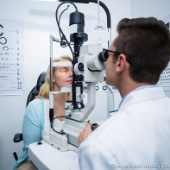Gynaecology or gynecology is the medical practice dealing with the health of the female reproductive systems and the breasts. Outside medicine, the term means "the science of women".
Neurology is the branch of medicine that deals with disorders of the nervous system, which include the brain, blood vessels, muscles and nerves. The main areas of neurology are: the autonomic, central and peripheral nervous systems.
Urology is a part of health care that deals with diseases of the male and female urinary tract (kidneys, ureters, bladder and urethra). It also deals with the male organs that are able to make babies (penis, testes, scrotum, prostate, etc.).
Ophthalmology is a branch of medicine dealing with the diagnosis, treatment and prevention of diseases of the eye and visual system.
The term cardiology is derived from the Greek words “cardia,” which refers to the heart and “logy” meaning “study of.” Cardiology is a branch of medicine that concerns diseases and disorders of the heart.
A branch of medicine that specializes in the diagnosis and treatment of cancer. It includes medical oncology (the use of chemotherapy, hormone therapy, and other drugs to treat cancer), radiation oncology (the use of radiation therapy to treat cancer), and surgical oncology (the use of surgery and other procedures to treat cancer).
What is Gastroenterology? Gastroenterology is the study of the normal function and diseases of the esophagus, stomach, small intestine, colon and rectum, pancreas, gallbladder, bile ducts and liver.
Critical care helps people with life-threatening injuries and illnesses. It might treat problems such as complications from surgery, accidents, infections, and severe breathing problems. It involves close, constant attention by a team of specially-trained health care providers.







